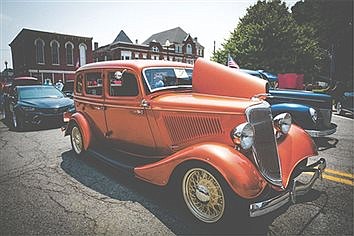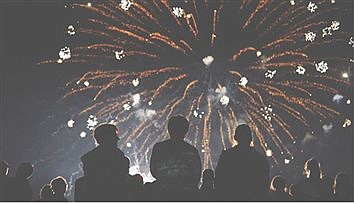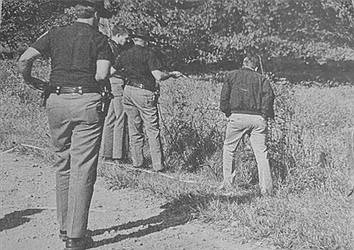There is just something about Friday the 13th
January 11, 2023 at 6:40 p.m.

January 13, 2023, is a Friday, the first of two Friday the 13ths we'll see this year. If you suffer from friggatriskaidekaphobia – an irrational fear of Friday the 13th–you might want to stay home. For most of us, the date is historically pretty average in terms of Luck, whether good or bad. But where did this day's spooky reputation begin?
Long before the 1980 slasher flick "Friday the 13th" introduced the masses to a hockey-masked Jason Voorhees, the date had stirred up fear and superstition. The number 13 has perhaps been considered unlucky since ancient times. One Norse myth told of a dinner party for 12 gods, crashed by the trickster god Loki, who shot Balder (the god of joy and happiness). In Christian lore, the tale of the Last Supper similarly considers Christ's betrayer Judas as the "unlucky" 13th guest. Legend thus held that a table of 13 foretold death, and dinners would cap seats at 12. In many old Tarot decks, the thirteenth card represents “Death”. Buildings often skipped 13th floors, hospitals and hotels won't have room number 13, and couples often avoid the date for wedding plans. Mark Twain held other ideas, and having been seated as the 13th guest at a dinner party, quipped that the affair was indeed unlucky, in that "They only had food for 12." Many used the number's notoriety to their advantage. According to the New York Historical Society, Captain William Fowler was a prominent soldier in the Civil War who ran in high-profile circles in the late 1800s, and counted some former presidents as friends. Fowler noticed that the number 13 had repeatedly appeared throughout his life (he went to Public School No. 13 in New York City, where he graduated at 13, for example. In construction he'd built 13 buildings and fought in 13 battles at war). Fowler took issue with the number's unpopularity and decided to combat the "popular superstition against thirteen," according to his obituary. He famously started the Thirteen Club, holding its first meeting on Friday, Jan. 13, 1882, at 8:13 p.m., in room 13 of Fowler's bar, the Knickerbocker Cottage. Four former U.S. presidents (Chester A. Arthur, Grover Cleveland, Benjamin Harrison and Theodore Roosevelt) would join the Thirteen Club's ranks at one time or another.
In 1907, author Thomas William Lawson published the novel "Friday the 13th," a story of Wall Street thieves who cashed in on the unlucky day, and spread the superstition's popularity even further. However, while there have been some very unlucky events recorded that occurred on the date, it has proven to be no better or worse than any other. So enjoy this mid-month precursor to your weekend. We will see the next one in October.
Latest News
E-Editions
Events
January 13, 2023, is a Friday, the first of two Friday the 13ths we'll see this year. If you suffer from friggatriskaidekaphobia – an irrational fear of Friday the 13th–you might want to stay home. For most of us, the date is historically pretty average in terms of Luck, whether good or bad. But where did this day's spooky reputation begin?
Long before the 1980 slasher flick "Friday the 13th" introduced the masses to a hockey-masked Jason Voorhees, the date had stirred up fear and superstition. The number 13 has perhaps been considered unlucky since ancient times. One Norse myth told of a dinner party for 12 gods, crashed by the trickster god Loki, who shot Balder (the god of joy and happiness). In Christian lore, the tale of the Last Supper similarly considers Christ's betrayer Judas as the "unlucky" 13th guest. Legend thus held that a table of 13 foretold death, and dinners would cap seats at 12. In many old Tarot decks, the thirteenth card represents “Death”. Buildings often skipped 13th floors, hospitals and hotels won't have room number 13, and couples often avoid the date for wedding plans. Mark Twain held other ideas, and having been seated as the 13th guest at a dinner party, quipped that the affair was indeed unlucky, in that "They only had food for 12." Many used the number's notoriety to their advantage. According to the New York Historical Society, Captain William Fowler was a prominent soldier in the Civil War who ran in high-profile circles in the late 1800s, and counted some former presidents as friends. Fowler noticed that the number 13 had repeatedly appeared throughout his life (he went to Public School No. 13 in New York City, where he graduated at 13, for example. In construction he'd built 13 buildings and fought in 13 battles at war). Fowler took issue with the number's unpopularity and decided to combat the "popular superstition against thirteen," according to his obituary. He famously started the Thirteen Club, holding its first meeting on Friday, Jan. 13, 1882, at 8:13 p.m., in room 13 of Fowler's bar, the Knickerbocker Cottage. Four former U.S. presidents (Chester A. Arthur, Grover Cleveland, Benjamin Harrison and Theodore Roosevelt) would join the Thirteen Club's ranks at one time or another.
In 1907, author Thomas William Lawson published the novel "Friday the 13th," a story of Wall Street thieves who cashed in on the unlucky day, and spread the superstition's popularity even further. However, while there have been some very unlucky events recorded that occurred on the date, it has proven to be no better or worse than any other. So enjoy this mid-month precursor to your weekend. We will see the next one in October.





